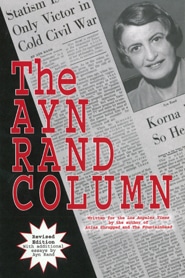

In 1962 Ayn Rand accepted an invitation to write a weekly column for the Los Angeles Times. The column became enormously popular, covering a wide variety of topics: from the welfare state to freedom of speech to foreign policy to the death of Marilyn Monroe.
Unlike so much “journalistic commentary — which is stale and irrelevant just days, or hours after it is written — virtually nothing of hers becomes outdated,” explains editor Peter Schwartz in his introduction. “Her perspective is that of a grand historian whose time frame is the centuries and whose function is to explain the world by reference to universal truths.”
Rand found that she could not keep up with the demands of a weekly column and regretfully discontinued it after one year.
— Peter Schwartz, “Introduction,” The Ayn Rand Column
In 1962 Ayn Rand accepted an invitation to write a weekly column for the Los Angeles Times, and from events and controversies of the time she drew timeless lessons. Commenting on the Cuban missile crisis, for example, she discusses the inevitable consequences of appeasement — at home and abroad. About the Algerian civil war, she observes: “A majority without an ideology is a helpless mob, to be taken over by anyone.” And about socialistic policies espoused by liberals and conservatives, she argues that “no one’s welfare can be achieved by anyone’s sacrifice.”
The twenty-six columns range widely in topic — from a celebration of Victor Hugo’s novel Ninety-Threeand Britain’s entry into the (European) Common Market to the causes of war and peace.
The collection also contains several other hard-to-find writings by Rand, including “The Only Path to Tomorrow,” a 1944 Reader’s Digest article on individualism, and “Why I Like Stamp Collecting.” The second edition, published in 1998, includes Rand’s article “The Fascist New Frontier,” a controversial piece that draws parallels between the political ideology of President Kennedy and the Fascist dictators of Europe.
“None of the objects of the humanitarians’ tender solicitude, the juvenile delinquents, could have had so sordid and horrifying a childhood as did Marilyn Monroe.
“To survive it and to preserve the kind of spirit she projected on the screen — the radiantly benevolent sense of life, which cannot be faked — was an almost inconceivable psychological achievement that required a heroism of the highest order. Whatever scars her past had left were insignificant by comparison.
“She preserved her vision of life through a nightmare struggle, fighting her way to the top. What broke her was the discovery, at the top, of as sordid an evil as the one she had left behind — worse, perhaps, because incomprehensible. She had expected to reach the sunlight; she found, instead, a limitless swamp of malice.”
— Ayn Rand, “Through Your Most Grievous Fault,” The Ayn Rand Column
Freedom of speech, Rand argues, is crucial because it protects “the rights of unpopular minorities, of non-conformists or innovators.” One of the four characteristics that mark a country unmistakably as a dictatorship, she holds, is censorship.
Rand thus regarded it as particularly troublesome that the concept of free speech was coming under attack — not by openly opposing it, but by perverting its meaning.
“Freedom of speech,” Rand writes, “means: freedom from suppression, interference or punitive action by government — and nothing else.” But statists are “struggling to spread the idea that a ‘right’ includes its material implementation — that the right to ‘free speech’ includes a right to demand the financial support of others, whether they agree with one’s views or not — and that a private individual’s refusal to finance an opponent constitutes a violation of the opponent’s ‘rights.’”
To protect the right to free speech, one needs to be fully clear on its actual meaning.
Rand devoted a significant number of her columns not to politics or world affairs but to art.
Rand’s praise runs from two of history’s greatest Romantic writers — Victor Hugo and Edmond Rostand — to the contemporary detective stories of Mickey Spillane. Her condemnation ranges from “most of today’s so-called ‘serious’ writers” to those attacking the popular television show The Untouchables.
Throughout her comments, Rand stresses the importance of art to a rational person, the importance of experiencing a concrete projection of values and ideals. And she showcases how the field of art functions as a barometer of the philosophical health or disease of a culture.
Many intellectuals display contempt for the intelligence of non-intellectuals. Rand objects, convinced that “the general public is much more intelligent than its alleged leaders give it credit for; that people do care for ideas and are searching desperately for the spokesmen of reason; that only reason can work, though not always immediately.”
Rand viewed the success of her column — and of her best-selling novels — as a testament to this fact. Her columns always tackle their subjects from an abstract, philosophical viewpoint. They do not talk down to readers, but respect their minds.
“From the start of my career, the issue I found hardest to fight . . . was the blind, malevolent stubbornness of men who kept telling me that my work was too intellectual and that ‘the public doesn’t think.’”
It was the thinking public that Rand sought and found.
To defend the good, Rand maintains, it is necessary to understand the nature of evil. Throughout her columns Rand guides her readers to her unique understanding of the nature of evil and its influence in the world.
Rand describes the essence of evil as “hatred of the good for being the good — hatred of ability, of beauty, of honesty, of earnestness, of achievement and, above all, of human joy.” Although such an attitude is found in every era, Rand warns that “Today, it is all around us; it is the style and fashion of our century.”
This attitude, according to Rand, is what motivates the collectivists who crusade against capitalism — not love for “the poor” or for human equality. “If capitalism had never existed, any honest humanitarian should have been struggling to invent it. But when you see men struggling to evade its existence, to misrepresent its nature and to destroy its last remnants — you may be sure that whatever their motives, love for man is not one of them.”
One of the biggest threats to freedom, Rand argues, is the growing trend of denouncing political ideology — not a specific ideology, but every invocation of political principles.
Behind this trend is the desire of supporters of government intervention, such as President Kennedy, to silence any principled opposition to their statist policies, not by defending their policies, but by condemning political principles as such.
What is desperately needed is to approach political issues in terms of principle. Under capitalism “the power of the government is limited by law to the role of a policeman that protects men’s rights and uses force only against those who initiate its use. This is the basic political principle of the only social system that banishes force from human relationships . . . . But a statist system — whether of a communist, fascist, Nazi, socialist or ‘welfare’ type — is based on the opposite principle: on the government’s unlimited power, which means: on the rule of brute force.”